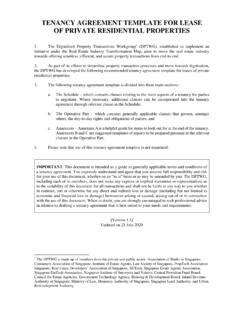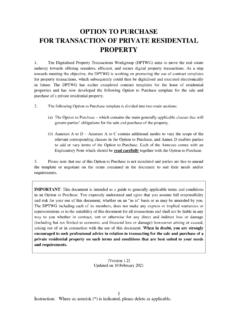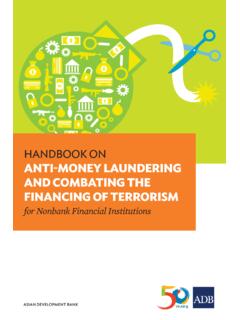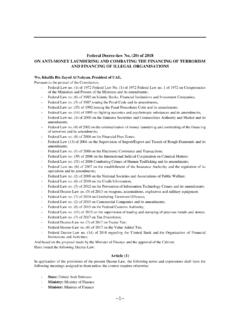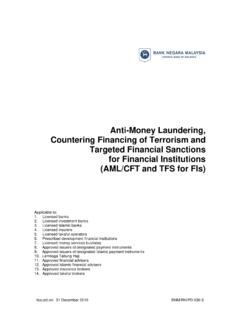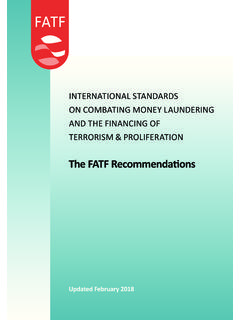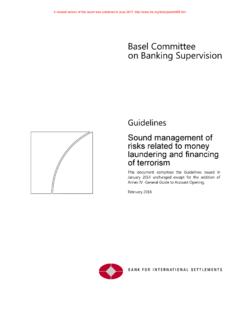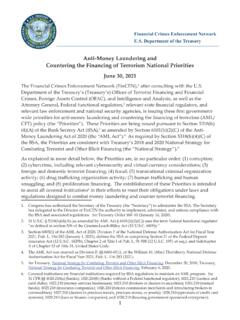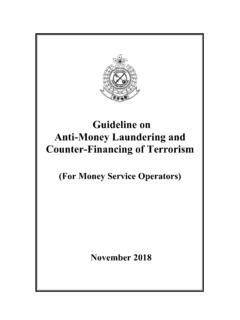Transcription of PRACTICE GUIDELINES ON THE PREVENTION OF MONEY …
1 1 S/N Version History Date Issued 1 1 4 Oct 2019 2 2 21 Feb 2020 3 PRACTICE GUIDELINES ON THE PREVENTION OF MONEY laundering AND COUNTERING THE financing OF terrorism PG 01-19 DATE OF ISSUE: 21 FEB 2020 2 PRACTICE GUIDELINES ON THE PREVENTION OF MONEY laundering AND COUNTERING THE financing OF terrorism PREAMBLE 1 The Council for Estate Agencies (CEA) issued PRACTICE Circulars (PC) 04-15 and 03-17 on anti- MONEY laundering (AML) and countering the financing of terrorism (CFT) to inform estate agents and salespersons of the appropriate preventive measures to be adopted against such activities that might be conducted through property transactions.
2 The two main legislations against MONEY laundering and terrorist financing in Singapore are the Corruption, Drug Trafficking and other Serious Crimes (Confiscation of Benefits) Act, and the terrorism (Suppression of financing ) Act. In addition, estate agents and salespersons should take note of the sanction requirements under the regulations of the United Nations (UN) Act, which will be elaborated in this PRACTICE GUIDELINES (PG 01-19). 2 PC 04-15 highlighted the key provisions, offences and the obligations for compliance by estate agents and salespersons, while PC 03-17 sets out the checklists to guide estate agents and salespersons to comply with PC 04-15.
3 3 CEA has reviewed PC 04-15 and PC 03-17 as part of our regular reviews to fully meet existing AML/CFT requirements. This PRACTICE GUIDELINES (PG 01-19) supersedes PC 04-15 and PC 03-17, and takes effect from 1 January 2020. 3 OVERVIEW OF MONEY laundering AND financing OF terrorism 4 MONEY laundering (ML) is a problem of international proportion. The laundering of proceeds of crime allows criminals to legitimise and enjoy their ill-gotten gains, and in turn provides them with greater incentive to commit financial crime.
4 In addition, terrorist attacks in countries and cities in many parts of the world have increased the focus of governments worldwide on the need to take additional measures to counter terrorism and terrorist financing (TF). 5 The Financial Action Task Force (FATF) is an international task force established in 1989 to develop international standards to combat MONEY laundering and the financing of terrorism and proliferation. The FATF published a revised set of 40 recommendations on AML/CFT measures in 2012, and was last updated in Jun 2019.
5 As a member of the FATF, Singapore is committed to implementing these recommendations in an effective manner. 6 Apart from the financial sector, FATF identified the real estate agency sector and other designated non-financial business and professions such as company service providers, casinos, accountants, pawnbrokers, precious stones and metals dealers, and lawyers as gatekeepers to counter the threat of ML/TF. 7 The real estate sector can be an attractive avenue for criminals and even terrorist groups to perpetuate criminal deeds and launder tainted funds given the large sums involved.
6 Estate agents and salespersons help clients to transact properties and this could involve or facilitate the movement of large amounts of funds, sometimes across international boundaries. Estate agents and salespersons should be aware that they could be used as conduits to receive or transfer proceeds of crime or to further remit them to third parties. Two real case examples are provided at Annex A. 8 ML/TF compromises Singapore s economy, safety and security. These illegal activities can expose our financial and non-financial sectors to criminal abuse.
7 It is important for all stakeholders, including the estate agency industry, to play our part to counter these threats. Description of MONEY laundering and financing of terrorism 9 ML/TF are illegal activities under Singapore law. A description of them is provided at Annex B. SINGAPORE S MAIN LEGISLATION AGAINST MONEY laundering AND financing OF terrorism A) Corruption, Drug Trafficking and other Serious Crimes (Confiscation of Benefits) Act 10 The Corruption, Drug Trafficking and other Serious Crimes (Confiscation of Benefits) Act, commonly known as the CDSA, is the primary legislation enacted to combat MONEY laundering in Singapore.
8 The CDSA criminalises the laundering of proceeds derived from drug dealing, corruption and other serious offences, and allows for the seizure and confiscation of such proceeds. 4 11 According to the provisions in the CDSA, under sections 43 and 44, it is an offence for any person, including estate agents and salespersons, to assist another to retain benefits of drug dealing or criminal conduct. It is an offence to enter into, or is otherwise being engaged in or taking part in an arrangement, knowing or having reasonable grounds to believe that another person has been/is involved in, or has benefited from drug dealing or criminal conduct, and by that arrangement will facilitate: a) The retention or control of that person s benefits of drug dealing or criminal conduct.
9 Or b) The use of benefits of drug dealing or criminal conduct to secure funds directly or indirectly, or acquire property (by way of investment or otherwise) for that person. 12 Under sections 46 and 47 of the CDSA, it is an offence for any person to acquire, possess, use, conceal or transfer benefits of drug dealing or criminal conduct. It is an offence for any person who, knowing or having reasonable grounds to believe that any property is, in whole or in part, directly or indirectly, represents another person s benefits of drug dealing or criminal conduct, conceals, disguises, converts or transfers that property or removes it from the jurisdiction.
10 13 Persons who are found to have committed the offences set out in sections 43, 44, 46, and 47 of the CDSA are liable to be punished with a fine not exceeding $500,000 or to imprisonment for a term not exceeding 10 years, or to both. Where the offender is not an individual ( a company), the penalty is a fine not exceeding $1 million or twice the value of the property in respect of which the offence was committed, whichever is higher. Lodging a Suspicious Transaction Report as a Legal Obligation 14 Lodging Suspicious Transaction Reports (STR) is an important tool in combating ML/TF.


